
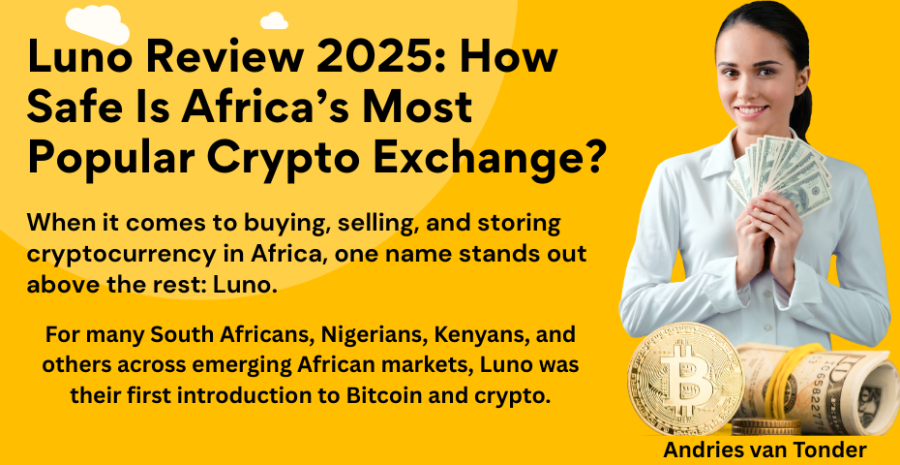
When it comes to buying, selling, and storing cryptocurrency in Africa, one name stands out above the rest: Luno. Since its founding in 2013 in Cape Town, South Africa, Luno has steadily grown into one of the continent’s most recognized and widely used cryptocurrency exchanges.
For many South Africans, Nigerians, Kenyans, and others across emerging African markets, Luno was their first introduction to Bitcoin and crypto.
Over the past decade, it has built a reputation for safety, accessibility, and ease of use — but in 2025, with rising competition from newer exchanges like VALR, Binance Africa, and Yellow Card, many investors are asking the same question: Is Luno still the best and safest choice for Africans looking to trade crypto?
This review dives deep into Luno’s strengths and weaknesses, how it stacks up against competitors, and whether it still deserves its crown as Africa’s leading crypto platform. We’ll explore its security track record, its fee structure, the range of supported coins, and most importantly, its overall safety for everyday investors.
Whether you’re a long-time user like those who’ve trusted it since 2013 or someone considering your first Bitcoin purchase, this Luno Review 2025 will help you decide if Luno is the right exchange for your crypto journey in Africa.
.png)
South Africa is where it all started for Luno. Fast forward to today, where we have two offices in the country. Our first office is situated in the economic centre of the nation, Johannesburg. The second is located in the picturesque tech hub, Cape Town. Whether you work remotely or join us in the office, you'll be welcomed by passionate, collaborative and hard-working team mates.
Luno was launched in 2013 under the name BitX before rebranding to Luno, quickly becoming a pioneer in the African crypto space. Unlike many fly-by-night exchanges that came and went, Luno established itself as a serious, regulated player, working to comply with South Africa’s financial regulations and later expanding into more than 40 countries worldwide.
Its headquarters in Cape Town gave it an edge, as it understood the unique needs of African users, particularly around fiat on-ramps and mobile accessibility. In 2020, Luno was acquired by the Digital Currency Group (DCG), a heavyweight in the global crypto industry, further solidifying its credibility and financial backing.
In 2023, it officially registered with the Financial Sector Conduct Authority (FSCA) in South Africa, reinforcing its commitment to regulatory compliance and consumer protection.
This is a key reason why many long-term users, some active since 2013, still trust Luno — it has weathered multiple bull and bear markets, survived industry shakeouts, and avoided the collapses that plagued less reliable exchanges.
P.S -Trust is not built overnight in crypto, but Luno’s decade-long track record makes it one of the most reliable names in Africa today.
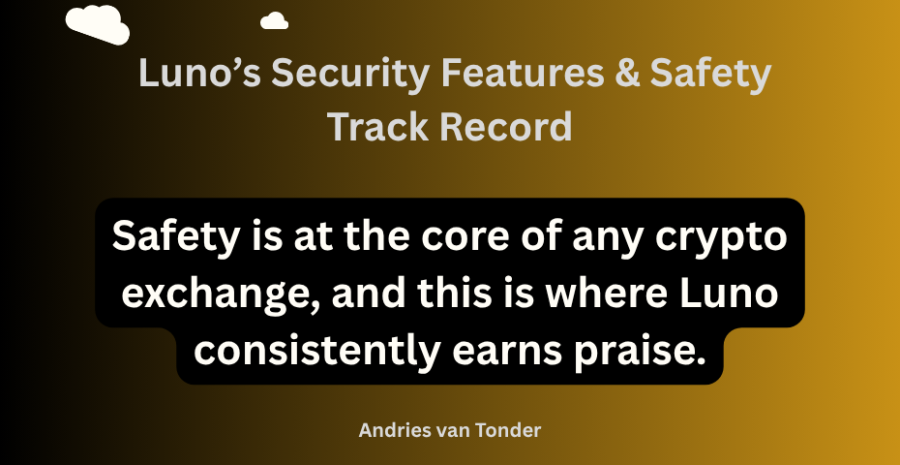
Safety is at the core of any crypto exchange, and this is where Luno consistently earns praise. The platform employs two-factor authentication (2FA), biometric app login, cold storage for the majority of customer funds, and advanced encryption for sensitive data.
Unlike some global exchanges that faced massive hacks, Luno has never experienced a major security breach that resulted in customer losses — a rare achievement in the crypto world. Funds are managed with strict internal controls, and the company is transparent about its security measures.
For example, withdrawals often require additional verification steps, which some users may find inconvenient but ultimately adds an extra layer of protection.
Compared to Binance Africa, which has dealt with regulatory scrutiny worldwide, or smaller exchanges that may not have robust protections in place, Luno stands out as a secure, conservative choice for African users.
Its safety-first approach appeals to everyday investors who prioritize peace of mind over high-risk features like leveraged trading.
While no exchange is 100% immune to risks, Luno’s decade-long clean record makes it one of the safest platforms for crypto trading in Africa today.

One of Luno’s biggest strengths is its user-friendly design, which makes crypto trading accessible even to complete beginners.
The mobile app, available on both iOS and Android, is sleek, intuitive, and simple to navigate. Users can buy Bitcoin or Ethereum in just a few taps, check real-time prices, and transfer funds instantly.
Luno also integrates educational resources within the app, helping newcomers understand the basics of crypto, wallets, and blockchain technology.
For those in Africa where internet access may be slower or less stable, Luno’s lightweight interface is an advantage compared to heavier platforms like Binance.
While exchanges like VALR cater more to advanced traders with professional-grade tools, Luno positions itself as the everyday person’s crypto app — ideal for those who want convenience without complexity.
Its accessibility also extends to fiat deposits: users can fund their accounts using local bank transfers, PayFast, and other region-specific methods, something that global exchanges often overlook.
This combination of simplicity, local integration, and mobile-first design explains why Luno remains a top choice for millions of African users in 2025 and beyond.

When it comes to fees, Luno is competitive but not necessarily the cheapest option on the market. Its trading fees range from 0% to 0.1% for makers and 0.25% for takers, depending on transaction volume. Instant buy/sell options, which appeal to beginners, carry higher spreads — sometimes around 2% — which can eat into profits for frequent traders.
Compared to VALR, which offers lower trading fees for high-volume users, or Binance Africa, known for ultra-low fees globally, Luno sits somewhere in the middle. However, what sets Luno apart is its transparency: fees are clearly displayed before transactions, and there are no hidden charges.
Many smaller African exchanges lure users in with “free” trades but then surprise them with poor spreads or high withdrawal fees.
Luno may not be the cheapest, but it is predictable and fair, which for many everyday users is more valuable than chasing the absolute lowest cost. If you’re a casual investor who buys small amounts regularly, Luno’s fee structure won’t hurt you.
But if you’re a professional trader moving large volumes, you might find better rates on competitors like VALR or Binance.
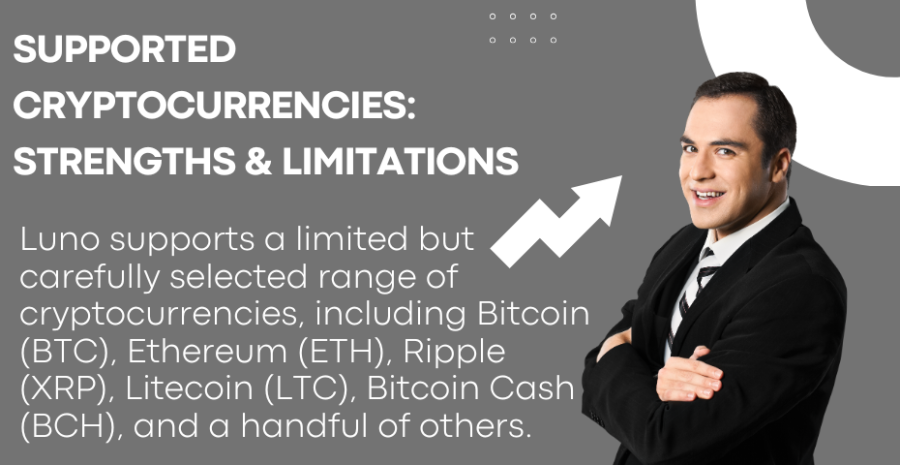
Luno supports a limited but carefully selected range of cryptocurrencies, including Bitcoin (BTC), Ethereum (ETH), Ripple (XRP), Litecoin (LTC), Bitcoin Cash (BCH), and a handful of others. In 2025, this is both a strength and a weakness.
On one hand, Luno avoids the speculative, high-risk tokens that flood other exchanges, focusing only on established coins with strong liquidity. This makes it safer for beginners who might otherwise fall into meme coin traps.
On the other hand, compared to Binance or VALR, which support hundreds of tokens, Luno’s selection can feel restrictive to advanced traders looking for portfolio diversification. For those who simply want to buy and hold the most recognized cryptocurrencies, Luno is perfect.
But if your strategy involves exploring DeFi tokens, NFT-related assets, or emerging altcoins, you’ll likely need a secondary exchange account.
Still, Luno’s conservative coin listing strategy fits with its safety-first philosophy, protecting less experienced investors from extreme volatility and scams.
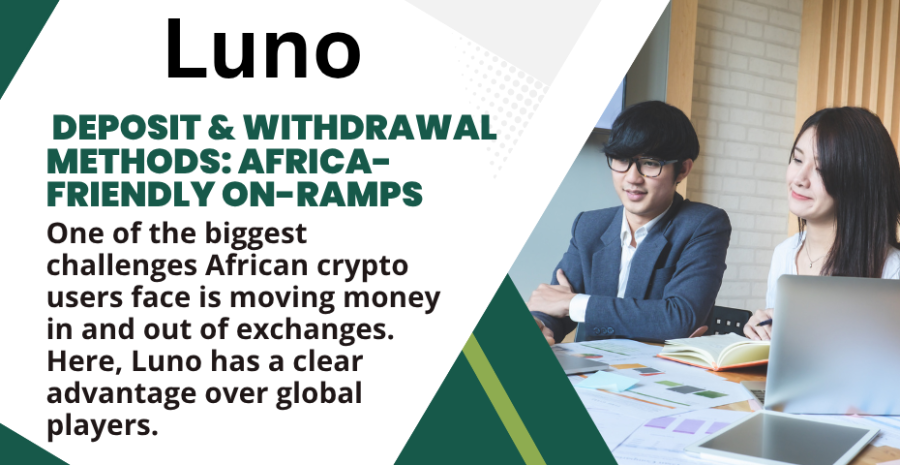
One of the biggest challenges African crypto users face is moving money in and out of exchanges. Here, Luno has a clear advantage over global players. It supports local bank transfers in South Africa, Nigeria, Zambia, and other African countries, making fiat-to-crypto conversion straightforward.
Withdrawals are generally processed quickly, and many users report smooth experiences with minimal delays. In South Africa, integration with local banking systems makes Luno especially convenient, while alternatives like Binance often struggle with fiat access due to regulatory pressure.
VALR, being another South African exchange, also provides strong local integration, but Luno’s longer track record gives it an edge in trust.
The ability to deposit and withdraw in local currency is critical for African traders who cannot rely on international payment rails, and Luno has mastered this feature.
It’s one of the reasons why so many Africans continue to choose Luno as their gateway into crypto, even if they later use other exchanges for advanced trading.
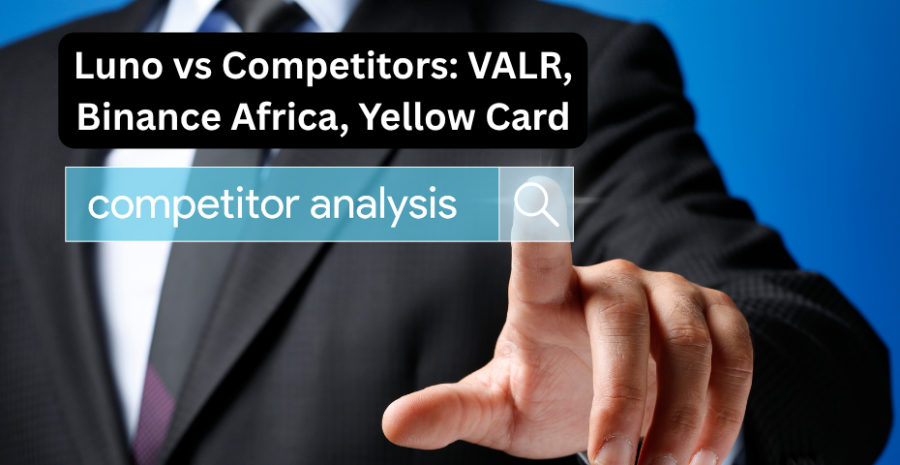
To determine if Luno is the best, we have to compare it with competitors. VALR, another South African exchange, has grown rapidly thanks to its low fees and wider coin selection, making it attractive to advanced traders.
Binance Africa offers the broadest range of cryptocurrencies and features like futures and staking, but it faces ongoing regulatory scrutiny worldwide, raising questions about long-term reliability.
Yellow Card, meanwhile, focuses on ease of fiat-to-crypto transactions across several African countries, but it doesn’t yet match Luno’s overall scale or trust.
Where Luno shines is its balance of safety, simplicity, and accessibility. It may not have the hundreds of tokens of Binance or the rock-bottom fees of VALR, but it offers a safe, regulated, beginner-friendly platform that has stood the test of time.
For African users prioritizing safety and ease of use, Luno often wins. For those chasing advanced trading or altcoin access, competitors may offer more options.
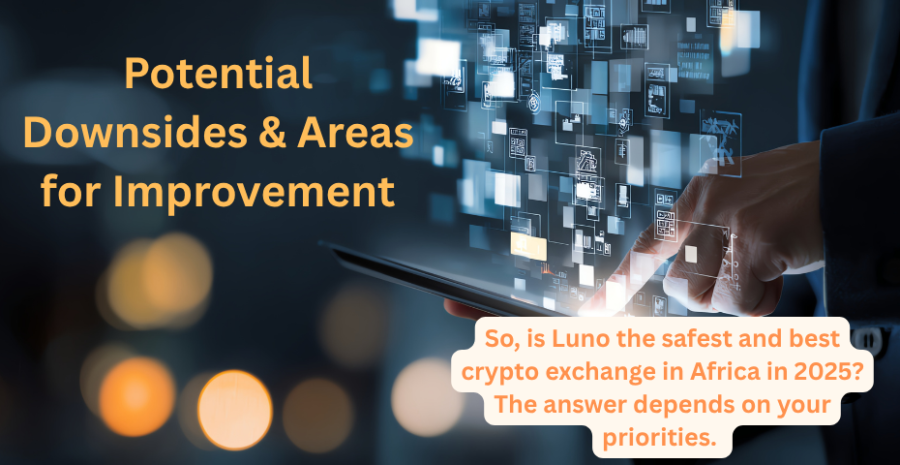
While Luno is widely trusted, it’s not perfect. The limited range of supported cryptocurrencies can frustrate those who want exposure to fast-growing altcoins.
Its fees, particularly for instant buy/sell, are higher than competitors like VALR, making it less appealing to frequent traders.
Luno also lacks some advanced features such as staking, futures trading, or decentralized finance (DeFi) integrations that have become standard on global platforms. Another limitation is customer support: while generally reliable, some users report delays during high-volume periods, which can be stressful when handling money.
In short, Luno is excellent for beginners and everyday investors, but serious traders may outgrow it. The good news is that Luno seems aware of these gaps, and future updates may expand its offerings.
For now, users need to weigh whether safety and simplicity outweigh the desire for advanced features and a wider coin selection.
.png)
9. Luno’s been the sensible voice in Crypto for more than 10 years
We’re celebrating a decade in the crypto industry, a huge milestone for any company but even more so for one in crypto where things happen a little faster.
Luno’s been the sensible voice in crypto for more than 10 years as we continue with our mission to put the power of crypto in everyone’s hands, and doing this safely and responsibly.
P.S : More info >>> HERE
Ten years ago there was no Ethereum, no publicly-listed crypto companies, and definitely no ape NFTs. Crypto Twitter was silently humming with outliers musing about the future of crypto but it wasn’t close to the hive it is today.
It was a time before Elon Musk tweets, a time when Michael Saylor was still bearish on Bitcoin. Can you imagine?
In 2013, it was hard to believe that a cryptocurrency would one day be accepted as legitimate payment by a handful of governments around the world, but here we are.
Crypto has come a long way. And so have we.
.png)
10. Industry-Leading Security Standards: Why Luno is Your Trusted Crypto Partner.
Luno crypto exchange is now a leading player in the Global Crypto Market and is the Largest Digital Asset Exchange in South Africa.
With more than 7 million users around the world, the Luno crypto exchange is now a leading player in the global crypto market and is the largest digital asset exchange in South Africa. This UK-based company offers an easy way to buy and sell cryptocurrencies through its web-based platform and intuitive mobile app.
If you are based in South Africa and looking for more details about Luno exchange before opening an account, in this Luno.
P.S Read more >> HERE
So, is Luno the safest and best crypto exchange in Africa in 2025? The answer depends on your priorities. If your main concern is security, regulatory compliance, trust, and ease of use, then Luno is hard to beat.
It has never suffered a major hack, has been regulated in South Africa, and has a decade-long track record of reliability. For newcomers or everyday investors in Africa who want a simple way to buy Bitcoin or Ethereum with local currency, Luno remains one of the best options available.
However, if you’re a more advanced trader seeking the lowest possible fees, access to hundreds of coins, or features like futures and staking, you may find better options with competitors like VALR or Binance Africa.
Ultimately, Luno’s strength is its balance of safety and simplicity, and that’s why millions of Africans continue to trust it in 2025. If you’re ready to explore crypto safely and want a reliable starting point, Luno deserves serious consideration.
👉 Sign up with Luno today through this link: Click HERE
P.S Andries van Tonder joined Luno in 2014 and never had a problem with them.
.png)
About: Andries vanTonder (66)
Over 46 years selfemployed
He is a Serial Entrepreneur, an Enthusiastic supporter of Blockchain Technology and a Cryptocurrency Investor
Find me at my Markethive Profile Page | My Twitter Account | My Instagram Acount | and my Facebook Profile.
